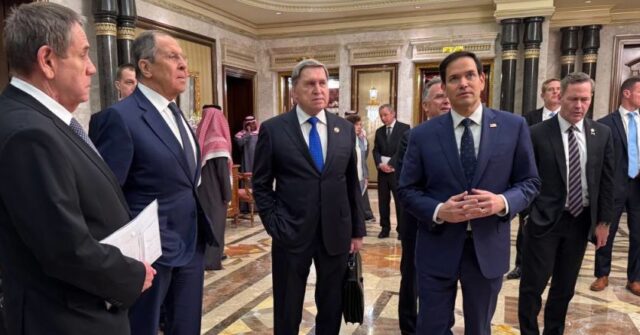Russia praised the first round of Ukraine war talks with the United States as “very useful”, while the American delegation said both sides had committed to “make sure the process moves forward in a timely and productive manner” and will work towards a Presidential meeting soon.
U.S. Secretary of State Marco Rubio met with his Russian counterpart Sergei Lavrov in Riyadh, Saudi Arabia on Tuesday for the first in-person talks of high-level delegations since Russia invaded Ukraine almost three years ago in 2022. After four and a half hours of talks the meeting broke, with both sides relating they felt it had been productive.
In terms of normalising diplomatic relations between Russia and the U.S., both sides are said to have agreed to return to staffing their embassies in the respective nations.
One of the intended outcomes of the talks was apparently laying the groundwork for an in-person meeting between U.S. President Donald Trump and Russian President Vladimir Putin for the actual war-ending negotiation process. No date has been set for that meeting, but it was said work was happening to enable it.
Advisor to President Putin and former Russian ambassador to the U.S., Yury Ushakov, who sat around the table with Rubio and Lavrov, said after leaving the meeting that it was not likely Trump and Putin would meet within the next week but that both wanted to meet eventually. He said: “The delegations of the two countries have a lot of work to do. We are ready for this but it is still difficult to speak about the specific date of the meeting between the two leaders… The issue was discussed. We are working out the terms of this meeting”.
US Secretary of State Marco Rubio (C), US National Security Advisor Mike Waltz (R) and US Middle East envoy Steve Witkoff attend an interview after meeting with Russian Foreign Minister Sergei Lavrov and Russian President Vladimir Putin’s foreign policy advisor Yuri Ushakov, at Diriyah Palace, in Riyadh, Saudi Arabia, on February 18, 2025. (Photo by EVELYN HOCKSTEIN / POOL / AFP) (Photo by EVELYN HOCKSTEIN/POOL/AFP via Getty Images)
While he said the meeting “went well” and there was “a serious conversation on all issues”, Ushakov noted it was “difficult to say” if there was any convergence of views between the U.S. and Russia so far.
The U.S. delegation also tamped down any hope for a rapid end to talks, making clear there was much work to do. Mission leader Rubio said the discussion had been “the first step of a long and difficult journey” and emphasised that “in order for a conflict to end, everyone involved in that conflict has to be okay with it, it has to be acceptable to them.”
One major feature of the discussion around the talks so far has been the apparent upset felt in European capitals, Kyiv included, that they were not included in today’s discussion. Ukraine has gone so far as to say it would ignore any peace deal it wasn’t involved in negotiating. Perhaps conscious of this, Rubio threw a bone to the European political class by saying they would be invited to the table when the time was right.
“There are other parties that have sanctions, the European Union is going to have to be at the table at some point, because they have sanctions as well that have been imposed,” he said.
Going into the talks, Russia had set out a hard-bargaining initial position that it would not consider giving up any Ukrainian territory. But Mike Waltz, who sat beside Rubio in the talks today, made clear the U.S. saw this merely as a place to be negotiated from, and that Russia withdrawing from parts of Ukraine was inevitable.
“We know just the practical reality is that there is going to be some discussion of territory, and there’s going to be discussion of security guarantees”, Waltz said, continuing: “Those are fundamental basics that will, that will undergird and underlie any type of discussion.”
Waltz also did happy talk for European partners but tempered this with warnings that if European states wanted a place at the top table, they would simply have to do more to contribute to the NATO alliance. He said: “If you’re going to bring both sides together, you have to talk to both sides. And we’ll continue to remind everyone, literally, within minutes of President Trump hanging up with President Putin, he called [and] spoke with President Zelensky.”
But reminding Europe that many of its countries don’t even meet the NATO minimum of two per cent of GDP on defence, he continued:
The fact that a third of our NATO allies still do not contribute the minimum of 2% of their GDP to defence a decade after we all collectively made that agreement isn’t acceptable
… This is a common effort. This isn’t just about what the United States is going to continue to contribute and what we are going to continue to ask of the American taxpayer. We all have to make those tough decisions.
We all have to contribute to our common defence, and we expect that this to be a two way street for our European allies, and the fact that both the United Kingdom, France, and others are talking about contributing more forcefully to Ukraine’s security, we think is a good thing.
Russia has also nettled Europe, saying including them in peace talks is pointless as the European Union is so dead-set on continuing the war. Indeed, as talks progressed, Russia’s Deputy Foreign Minister spoke in Moscow and said he believed Europe’s real war aim in supporting Ukraine was to “inflict a strategic defeat on Russia.”
He also said Russia was against the European plan to deploy NATO soldiers to Ukraine as peacekeepers, saying Moscow would view this as escalatory.
Read the full article here


